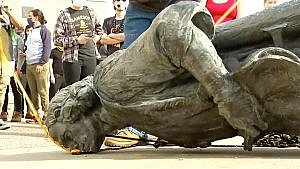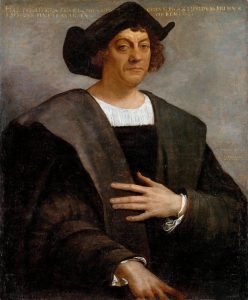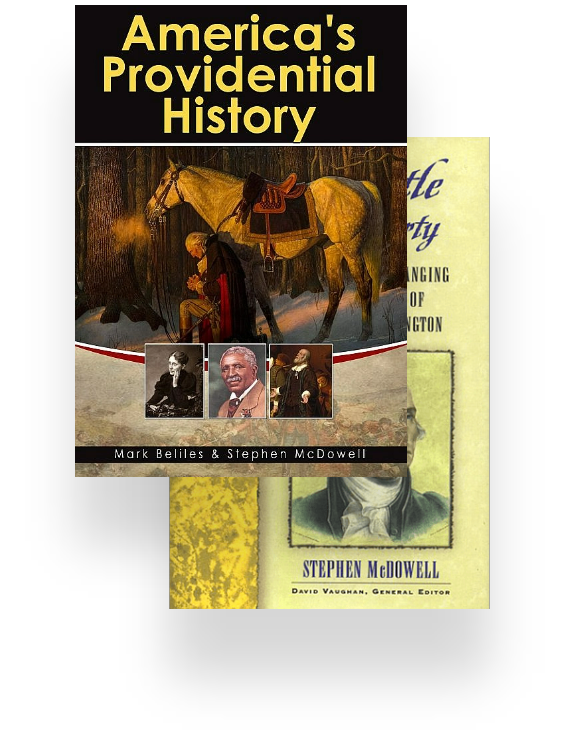PF UNIVERSITY


Stephen McDowell
Apparently Native American lives don’t matter to a group of Black Lives Matter protesters, who tore down a statue of Christopher Columbus on June 9 in Richmond, Virginia, and tossed it into a lake. Similar incidences have occurred in many cities. The Richmond activists said they were standing in solidarity with indigenous people, but being educated in government schools dominated by revisionist history and Marxist ideology, they were never taught that Columbus rescued untold thousands of peaceful Arawak natives from the cooking pots of the brutal cannibalistic Caribs.
During his exploration of the Caribbean Islands, Columbus encountered different native tribes, some peaceful and some vicious. The Caribs were especially feared by the Arawak’s and other natives since they were cannibals who regularly attacked and captured their peaceful neighbors.
The physician during Columbus’ second voyage, Dr. Diego Alvarez Chanca, describes an encounter they had with the Caribs on Guadeloupe Island. They asked some native women prisoners what the islanders were like who lived there. They said they were “Caribs” and were glad to learn the Europeans abhorred such kind of people who eat human flesh. Chanca wrote:
They told us that the Carib men use them with such cruelty as would scarcely be believed; and that they eat the children which they bear them, only bringing up those whom they have by their native wives. Such of their male enemies as they can take away alive they bring here to their homes to make a feast of them and those who are killed in battle they eat up after the fighting is over. They declare that the flesh of man is so good to eat that nothing can compare with it in the world; and this is quite evident, for of the human bones we found in the houses, everything that could be gnawed had already been gnawed so that nothing remained but what was too hard to eat; in one of the houses we found a man’s neck cooking in a pot…
In their wars on the inhabitants of the neighboring islands these people capture as many of the women as they can, especially those who are young and handsome and keep them as body servants and concubines; and so great a number do they carry off that in fifty houses we entered no man was found but all were women. Of that large number of captive females more than twenty handsome women came away voluntarily with us.
When the Caribs take away boys as prisoners of war they remove their organs, fatten them until they grow up and then, when they wish to make a great feast, they kill and eat them, for they say the flesh of women and youngsters is not good to eat. Three boys thus mutilated came fleeing to us when we visited the houses.[1]
Another man on that voyage, Michele de Cuneo, confirmed Carib atrocities:
The Caribs whenever they catch these Indians eat them as we would eat [goats] and they say that a boy’s flesh tastes better than that of a woman. Of this human flesh they are very greedy, so that to eat of that flesh they stay out of their country for six, eight, or even ten years before they repatriate; and they stay so long, whenever they go, that they depopulate the islands.[2]
The Carib’s cruelty was reflected and propagated in their religion. Cuneo writes:
We went to the temple of those Caribs, in which we found two wooden statues, arranged so that they look like a Pieta. We were told that whenever someone’s father is sick, the son goes to the temple and tells the idol that his father is ill and the idol says whether he should live or not; and he stays there until the idol answers yes or no. If he says no, then the son goes home, cuts his father’s head off and then cooks it.[3]
Cuneo also says that “the Caribs are largely sodomites,” and that “accursed vice” may have come to the other natives through them.[4]
When Columbus first heard stories from the Arawaks and others of how the Caribs captured, tortured, and ate them, Columbus could not believe it. But after speaking to many Arawak prisoners and observing first hand evidence, he became convinced.
It happened that the Caribs attacked Columbus’ men, and in response the Admiral sent a punitive force against them, capturing 1600 Carib prisoners in the fight. The Arawaks welcomed the defeat of their enemy, and would have liked to see them all destroyed. Hoping to civilize and Christianize these brutal men, Columbus sent 550 of them to Spain as prisoners. Another 650 were given to the local natives, who executed their own brand of justice upon them. The remaining 400 were set free.
Thus, Columbus delivered the peaceful Arawaks from the future brutal actions of their evil enemy, saving many lives from slavery and the roasting fire. I imagine these Arawaks would gladly display the Columbus statue torn down by the protesters. Far from being an oppressor, he was their liberator.
[1] Dr. Diego Alvarez Chanca, Letter, quoted by Felipe Fernandez-Arnesta, Columbus and the Conquest of the Impossible, New York: Saturday Review Press, 1974, p. 118.
[2] Michele de Cuneo, Letter, 1495, reprinted in Samuel Eliot Morison, Journals & Other Documents on the Life & Voyages of Christopher Columbus, New York: Heritage Press, 1963, p. 219.
[3] Ibid., p. 220
[4] Ibid.
PF UNIVERSITY
The courses offered by the Providence Foundation Biblical Worldview University (BWU) are designed to equip leaders of education, business, and politics to transform their culture for Christ, and to train all citizens how to disciple nations.
DONATE
Support Providence Foundation today! Choose Minuteman, Patriot, or Founder level and make a monthly impact. Or select ‘Custom’ to contribute now. Join us in shaping our nation’s future
